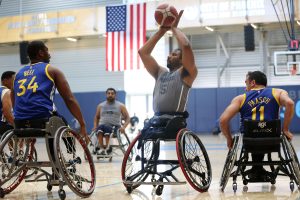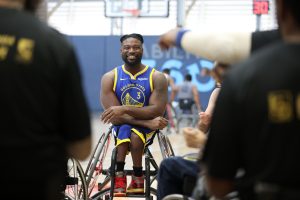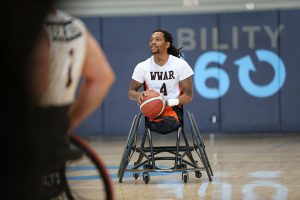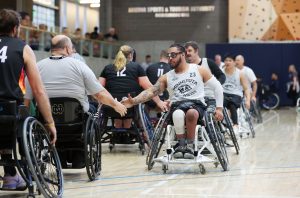- Slug: Sports-Wheelchair Basketball. 1,370 words.
- 4 photos available (thumbnails and captions below).
By James Powel
Cronkite News
PHOENIX – It’s Friday night, and the Suns’ bench is working the referees.
At the end of the third quarter, the bench complains that the refs missed a touch foul committed on Nickolas Pryor, leading to the second consecutive quarter-ending bucket.
If the name doesn’t ring a bell, that’s because the team haranguing the zebras wasn’t the NBA team but the Ability360 Wheelchair Suns of the National Wheelchair Basketball Association (NWBA). The team hosted the 23rd Annual D1 Phoenix Invitational over the weekend.
The event brought some of the best wheelchair basketball teams to the Valley and served as an early season test for the Suns squad, the only Division II team competing over the weekend.
“It’s one of my favorite events that we get to host here. It does take a lot of effort setting everything up, just with teams from all across the country,” said Pryor, who is the athletics program manager at Ability360 and a Suns player and coach. “Some of (the organizations) are volunteer based, some of them are homegrown, some of them are kind of put together. Some of them have affiliations with hospitals, some with nonprofits like ourselves.”
The Suns team is sponsored by the NBA team and Ability360. Ability360 is a resource center for people with disabilities that, according to its website, “advocates personal responsibility – by, and for, people with disabilities – as a means to independence.” The courts where the event was held bear the signature of NBA Suns’ guard Devin Booker.
Wheelchair basketball is one of the oldest adaptive sports, born out of the rehabilitation of World War II veterans. The first documented game was played in 1946, according to Wheelchair Basketball Canada. The game has been a staple of the Paralympics since the first games in Rome in 1960.
At the club level, the game is organized under the NWBA with multiple divisions. Not all players use wheelchairs in their daily lives, however competitive players must meet disability qualifications to play at the highest levels.
The wheelchair game rules differ somewhat from the NBA. For instance, back picking is allowed, and dribbling is not required but does prevent steals.
“The defenses are basically the same, but once you get the rebound and you go into your transition, in able bodied, you want to get the fastest method from point A to point B,” said Paul Jackson, head coach of the Golden State Road Warriors from Oakland, California. “In wheelchair basketball, once you get the rebound, you want to do some crossing, some cross-picking so that you can create a numbers situation.”
In spirit, however, the two games are indistinguishable. Multiple players shared a similar story of the first game they played wherein the difficulty of the game caught them unprepared.
“Wheelchair basketball is one of the most difficult sports you will ever play. I’ve played against NBA players who have been in chairs, I’ve played against college players who have gone on to the NBA and put them in chairs,” said Jeff Griffin, a player and coach for the Utah Wheelin’ Jazz who competed at the 2004 Paralympic games in Athens, Greece. “These great athletes, once they get in a chair they realize, holy crap, this is a tough sport to play. It neutralizes those who have great athleticism, but at the same time we’re competitors.”
Players said the game of wheelchair basketball is just as intense – or more – as other athletic competition.
“It’s competitors, they compete,” Griffin said. “Flint flies in the air, tempers fly, it’s a bunch of competitors that happen to be in wheelchairs.”
In their first game Saturday afternoon, the Wheelin’ Jazz tried to maintain a double-digit lead over the Mary Free Bed Pacers with just under five minutes to go in the fourth quarter. As the team huddled for a time out, Griffin admonished one of his teammates, Joshua Joines, for missing his defensive assignment. When Joines attempted to explain why he left his assignment, the Pacer’s best shooter, Griffin retorted, “I don’t give a s—.” The Jazz won, 68-54.
“A lot of times a person with a disability gets babied or … gets coddled, and I think it’s important that in their life they have friends and parents and sports that helps them get a little kick in the butt because we can do hard things. We can do most things,” Mike Schlappi, head coach of the Utah Wheelin’ Jazz said.
“They don’t want to be called disabled athletes, they want to be called athletes. They want that respect and that’s the respect I give them,” Jackson, who has been coaching the Golden State Road Warriors for over 40 years, said. “There’s time for teaching and there’s time for coaching. There’s not time for disabled teaching or disabled coaching, simple as that.”
Arthur Renowitzky plays guard for the Road Warriors, and, when substituted off the court during the team’s second Saturday game, he said, “this game saved my life.”
Renowitzky was shot outside of a San Francisco nightclub 15 years ago, robbed of the $20 he had in his pocket. He was a guard, cornerback and running back in high school whose family strongly encouraged him to be a part of team sports. When he awoke on Christmas Eve at 20 years old, doctors informed him that he was unlikely to speak or walk again.
“I was really depressed going from able bodied and being super independent to waking up in a hospital. Learning in the ICU that I would never walk, never talk again to getting my voice back,” Renowitzky said.
Renowitzky founded the Life Goes On Foundation, which promotes awareness for spinal cord injuries, adaptive sports and disability advocacy. Wheelchair basketball is a cornerstone of the foundation’s outreach.
The first time Renowitzky played the game was with Trooper Johnson, NWBA Hall of Fame player and the inspiration for the league’s logo. “From then on it was a huge passion of mine to play but also to help others get involved in the sport and help grow it,” Renowitzky said.
The Suns made one last push in their final game of the weekend against the Rancho Halos from Los Angeles. They trimmed the Halos’ lead to single digits and put themselves in the bonus with the majority of the quarter to go. They fell to the Halos, 58-34, and ended up without a win on the weekend. The team knew that the event would be tough as the Suns are in Division II and had been playing all weekend against teams in the division above them.
When Pryor began with the program at Ability360 as an assistant coach seven years ago, the program only had a Division III team but has since expanded to include teams in multiple divisions, including a junior program. For people within the game’s community, growing the game is the biggest challenge in front of them.
In a city as large as Phoenix, Pryor feels that there is room to grow the game. “There’s no reason why we couldn’t really build these programs and want everybody to know about us and just be a resource for the disabled community,” Pryor, who is also a professor at Arizona State University, said. “That’s one of my biggest goals is to educate not just the general population but the disabled community that these sports exist.”
As the visibility of the game grows, the financial support of the game needs to grow with it, according to Griffin.
“It’s just a matter of getting the word out now and getting some financing,” Griffin said. “One you gotta have players, two you gotta have leadership and three you gotta have money. We have players, we have leadership and we are starting to get the word out now.”
For Pryor, hosting the tournament is not only a test for the team but a step in expanding the game in Phoenix.
“(Playing up a division) is what I love. It’s a goal of mine to have a team in every division here in Phoenix. So it’s a goal of ours to have that DII team move up to DI or DIII up to DII, and that’s always been my goal,” Pryor said.
For more stories from Cronkite News, visit cronkitenews.azpbs.org.



